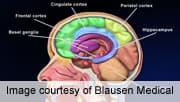Age-related forgetfulness is caused by protein deficiency, scientists studying humans and mice say
WebMD News from HealthDay

By Dennis Thompson
HealthDay Reporter
WEDNESDAY, Aug. 28 (HealthDay News) -- A protein in the brain could hold the key to reversing the age-related memory loss that causes "senior moments" of forgetfulness, Columbia University researchers report.
Deficiency of a protein called RbAp48 in the hippocampus appears to significantly contribute to the memory loss that creeps up on you as you age, said study co-author Dr. Scott Small, director of the Alzheimer's Disease Research Center at the university.
This is a distinct process separate from the drastic memory loss that comes with Alzheimer's disease, Small added. And, he said, the finding should allay fears that normal "senior moments," like misplacing keys or forgetting an ATM number, are a precursor to dementia.
"It's been known for a long time that our memory declines just by the normal wear and tear of the aging process," Small said. "Our study provides compelling evidence that age-related memory loss is a syndrome in its own right, apart from Alzheimer's."
The study, published Aug. 28 in the online edition of Science Translational Medicine, used a combination of human and mouse studies to explore the importance of RbAp48 in memory.
Researchers focused on the hippocampus, a part of the brain that is key to memory and is affected by both age-related memory loss and by Alzheimer's disease. But while Alzheimer's is attributed to the buildup of amyloid plaques in the brain's neurons, no such thing occurs in people experiencing memory loss due to natural aging.
The study began by researchers performing genetic analysis of the brain cells of eight deceased humans, ages 33 to 88, none of whom suffered from any brain disease. Doctors focused on the dentate gyrus, a part of the hippocampus that seems to be most affected by aging.
The most significant changes, they found, occurred in levels of RbAp48 in the dentate gyrus. The amount of RbAp48 declined steadily with aging across all the human subjects.
To confirm whether RbAp48 plays an active role in memory loss, the researchers turned to mice. Examinations of mouse brains found a similar decrease in the protein due to aging. "It turns out that age-related memory loss occurs very similarly in humans and mice," Small said.
Further, the researchers found that when they reduced the amount of RbAp48 in young mice, those mice experienced the same memory loss that occurs naturally in aging mice. Once the protein returned to normal levels, the young mice's memory returned to normal.
But what really raised eyebrows occurred when they increased the amount of RbAp48 in the brains of older mice. "We were astonished that not only did this improve the mice's performance on the memory tests, but their performance was comparable to that of young mice," said co-author Dr. Elias Pavlopoulos, an associate research scientist at Columbia.
source : Brain Protein Is a Key to 'Senior Moments,' Study Finds








